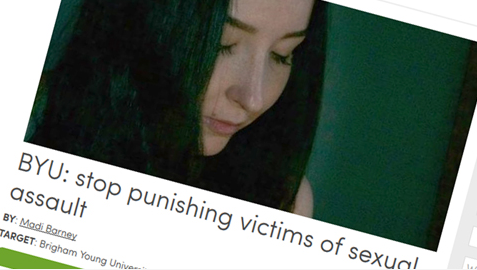Her name and her story became national headlines last spring as former BYU student Madi Barney called attention to the university’s policies on sexual assault reporting in April 2016.
Now she’s “on top of the world” upon hearing about BYU’s new updated policies dealing with how students who are victimized or witness sexual assault will be treated in the future.
Barney became the public face of controversy over how sexual assault reports were handled at BYU when she attended an on-campus rape awareness conference and asked a Title IX coordinator about the office’s practices. That question, and the following media firestorm, led to an online petition that received tens of thousands of signatures, and a student protest in front of the BYU administration building last spring.
In response to her story and others, university administrators formed an Advisory Council on Campus Response to Sexual Assault. President Kevin J Worthen announced the updated policies in an email on Wednesday, Oct. 26. The advisory council made 23 recommendations to the President’s Council, President Worthen said, which moved to adopt all of them. BYU will implement five of those changes immediately.

When the Daily Universe asked Barney for her reaction to the new policies, she said she learned about the changes while she was at work. She ran out and read the full report detailing the changes.
“I felt like crying because I was so happy. I saw the part with the amnesty clause in it, and my jaw literally dropped,” Barney said. “Having a victims’ advocate in there is definitely going to be helpful. I think that was kind of the biggest thing for me, and obviously the amnesty clause is huge.”
The amnesty clause and creation of a victim advocate position are two of the changes BYU will implement right away. The other immediate changes include the creation of a Title IX Office in a location separate from the Honor Code Office, the creation of a full-time Title IX coordinator position and an embargo on offices sharing information unless complainants consent or someone’s health is at risk.
BYU is changing “all the policies (she) wanted and more,” Barney said, and the only thing missing is a way to ensure the policies are being implemented.
“I wish there would be a route for victims to complain if something were to ever happen again,” Barney said. “Give them a safe place to say, ‘This is still happening.'”
But Barney remained positive about the outcome of the updated policies.
“I’m hoping that BYU can earn the confidence of everybody back and do by their word and do what they’re saying they’re going to do,” she said.
Barney said there’s always room for improvement, so she hopes people will continue discussing sexual assault, both inside and outside of Provo.
“There really is rape culture everywhere,” Barney said. “It’s not unique to BYU.”
Everyone can minimize the effects of rape culture, Barney said, and petitioning is not the only way to raise awareness or help survivors.
“When you see something in the news, don’t just discredit it. Try to start by believing,” Barney said. “Be there with your friends. If somebody tells you that that (sexual assault) happened to them, help them. Let them talk to you. Do what they feel is in their best interests.”
Barney created an online petition in April, asking BYU to “create an immunity clause so that victims can come forward without fear of retribution.” More than 117,000 people added their signatures to the petition.
President Worthen created the Advisory Council to review BYU’s existing policies in May. Student Life Vice President Jan Scharman and International Vice President Sandra Rogers worked with Ben Ogles, dean of the College of Family, Home and Social Sciences, and Julie Valentine, assistant professor in the College of Nursing, to make the policy recommendations.




